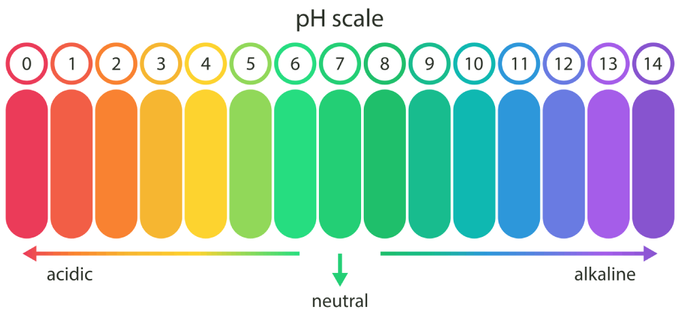6 Steps to Naturally Increase the pH of Drinking Water
Explore simple steps to increase the pH of your drinking water and improve its quality for a healthier hydration routine.
Updated February 4, 2025

Generally, the pH level of water varies between 6.5 and 8.5, and drinking water too far out of this range may not be safe. Normal drinking water has a neutral pH of 7. Once the pH level reaches 8 or 9, water is considered alkaline.
Alkaline water, enriched with higher levels of alkalizing minerals compared to tap water, is hailed by advocates as the healthiest option. They believe that consuming water with a higher pH can counteract acidity within the body.
6 Easy Steps to Raise pH in Water Naturally
1. Start by Testing Your Water’s pH Level
Whether you're drinking filtered water from a bottle, using an at-home water filter, or drinking tap water, it's possible to test your water's pH level. There are two easy ways to do this:
- Using a pH Meter: Fill a clean container with water and allow it to settle for a few minutes. Ensure the water covers the electrode tip for accurate readings. Insert the probe into the container and wait for equilibrium before reading the pH meter results.
- Using pH Papers: Dip a testing strip into a container of water for a few seconds. Once the strip changes color, match it to the provided chart to determine the pH level.
2. Add an Alkaline Substance to Your Water
If your water is neutral, or even on the acidic side, there are some natural substances you can add to increase its alkalinity.
- Fresh Lemon: Although lemon juice is acidic, adding it to your water in small amounts has an alkalizing effect on the body. Lemons are anionic, so once you drink the water, it becomes alkaline as your body reacts with the lemon's anions. Squeeze the juice from one fresh lemon into 8 glasses of water to sip on throughout the day.
- Baking Soda: This is a simple ingredient found in most kitchens. Baking soda sits at around 8.4 on the pH scale. The effect of baking soda will depend on your water's current pH level, and you won't be able to raise it past 8.4.
- Milk of Magnesia: Milk of magnesia is an alkaline suspension, which means it causes neutralization when it encounters anything acidic. This makes this substance great for water on the more acidic side. This milk comes with a dosing cap or in tablet form, so you can add one dose to 8 glasses of water to sip on throughout the day.
- pH Drops: pH drops contain potent, concentrated alkaline minerals. These drops can be purchased from health stores or online. Follow the specific instructions on the pH drops bottle when it comes to putting them in your water.
How much baking soda to add to raise the pH in drinking water? Mixing in 1 tsp (4 g) of baking soda with 250 ml of water will raise its pH, making it more alkaline.
3. Check Your Water’s pH Again
After adding your chosen substance, retest water pH to ensure it falls within the desired range of 8 to 9. Monitor your body's response and adjust alkalinity if adverse reactions occur.
4. Install a Neutralizing Filter
For a more permanent solution, consider installing a neutralizing filter in your home’s plumbing system. These filters typically contain materials like calcite (a form of limestone) or magnesium oxide that dissolve into the water as it passes through, effectively raising the pH level over time. This method provides continuous treatment and helps maintain stable pH levels.
5. Aerate Your Water
You can also aerate your water using the MAYU Swirl structuring device. The device creates a swirling motion in the water, which generates a vortex. This vortex action helps to draw air into the water, increasing the contact surface area between the air and water.
The introduction of air promotes the dissolution of oxygen in the water, which can lead to chemical reactions that increase pH levels. Specifically, dissolved oxygen can react with certain compounds in the water to form hydroxide ions, which are essential for raising pH.
The carafe is made from handblown borosilicate glass, ensuring durability and aesthetic appeal. The base is pure porcelain—with one of a kind pattern—adding a touch of elegance while acting as the vortex generator.
By ordering the MAYU Swirl, you get:
- Free 5–7 day shipping in the US
- Discounted rates for Alaska, Hawaii, and Puerto Rico
- 30 day money-back guarantee
- 2-year warranty
6. Consider Chemical Injection Systems
If you're dealing with significantly acidic water, chemical feed pumps can inject solutions like soda ash (sodium carbonate) or sodium hydroxide directly into your water supply.
This method is more complex and typically requires professional installation but can effectively neutralize acidity and raise pH levels quickly. But, be sure to consult a professional before you decide on installing this type of system.
Health Benefits of Drinking Higher-pH Water
While there isn't much research to support the health benefits of drinking alkaline water, many health professionals believe there are advantages.
- Enhanced Hydration: Alkaline water may positively impact hydration levels, especially post-exercise, and influence urine pH.
- Improved Digestion: Alkaline water is often deemed therapeutic for acid reflux sufferers, potentially aiding digestion by reducing intestinal acidity.
- Anti-Aging Effects: Some studies suggest that drinking alkaline water may slow down the aging process and promote longevity. [1]
- Bone Health Support: Alkaline water might have a beneficial effect on bone resorption, the breakdown and absorption of bone tissue.
Elevate Your Water, Elevate Your Health
By following these six simple steps, you can effectively increase the pH of your water and enjoy the potential health benefits associated with it. Remember to test the pH level regularly and adjust your methods as needed to maintain optimal alkalinity.
Whether you choose to add alkaline substances, install a neutralizing filter, or aerate your water, taking proactive steps to improve your water's pH can contribute to a healthier lifestyle.
FAQs
Is pH-9 water healthy?
Water with a pH of 9 is generally considered safe for consumption, as it is slightly alkaline. But, excessive alkalinity can affect taste and may indicate other water quality issues.
Does lemon water increase pH?
Lemon water typically has a low pH due to citric acid, but it can have an alkalizing effect after digestion, potentially raising the body's overall pH levels.
What household items raise pH in water?
- Baking soda: A common alkaline substance that neutralizes acidity.
- Lime juice: Although acidic, it can have an alkalizing effect after digestion.
- Washing soda: Often used in laundry, it significantly increases pH.
- Alkaline water filters: Devices that increase water's alkalinity through ionization.
What is the healthiest pH for drinking water?
The healthiest pH for drinking water is typically between 6.5 and 8.5. This range is considered optimal for taste, safety, and minimizing corrosion in plumbing systems.
Who can't drink alkaline water?
- People with kidney issues: They may struggle to maintain proper acid-base balance.
- Those with gastrointestinal problems: Conditions like acid reflux may worsen.
- Infants and young children: Their bodies are still developing and may not handle high alkalinity well.
References:
- M. Logozzi et al., “In vivo antiaging effects of alkaline water supplementation,” Journal of Enzyme Inhibition and Medicinal Chemistry, vol. 35, no. 1, pp. 657–664, Jan. 2020, doi: 10.1080/14756366.2020.1733547. Available: https://www.ncbi.nlm.nih.gov/pmc/articles/PMC7054916/
Disclaimer: The information published by MAYU Water is not a substitute for the expert knowledge, advice, and recommendations of trained professionals. We strongly recommend consulting with industry experts and primary or scientific sources before making any health, research-related, or other important decisions.













































